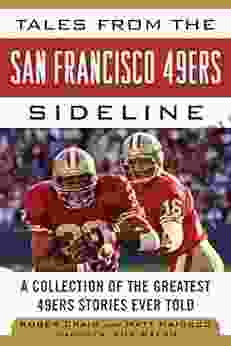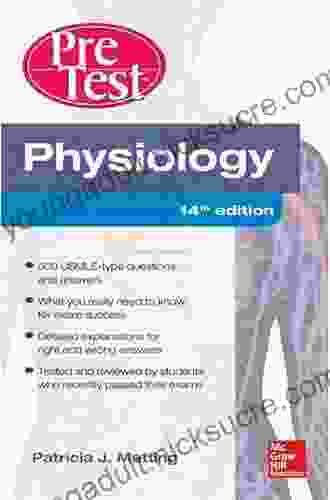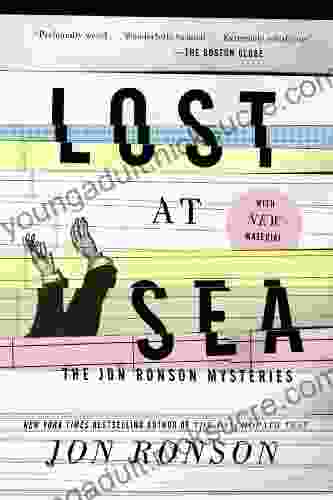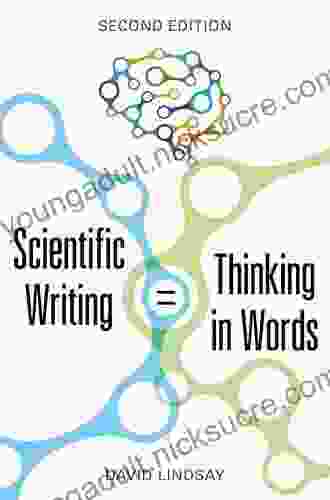Mastering Scientific Writing: Thinking in Words

Scientific writing is a specialized form of communication that requires the ability to translate complex research findings into clear and compelling prose. At the heart of effective scientific writing lies the concept of "thinking in words." This article will delve into this essential skill, providing practical strategies and insights to help scientists and researchers craft impactful scientific communications.
4.4 out of 5
| Language | : | English |
| File size | : | 1756 KB |
| Text-to-Speech | : | Enabled |
| Enhanced typesetting | : | Enabled |
| Word Wise | : | Enabled |
| Print length | : | 181 pages |
| Screen Reader | : | Supported |
What is Thinking in Words?
Thinking in words refers to the ability to organize and articulate thoughts and ideas through written language. It involves a deep understanding of the nuances of language, grammar, and scientific jargon. Scientists must be able to translate their research findings into prose that is accessible to their target audience, whether it be fellow scientists, policymakers, or the general public.
Benefits of Thinking in Words
Thinking in words offers numerous benefits for scientific writing:
- Enhanced Clarity: By translating thoughts directly into words, scientists can identify and eliminate ambiguities, inconsistencies, and redundancies in their writing.
- Increased Precision: Scientific writing demands precision and accuracy. Thinking in words allows scientists to choose the most appropriate terms and phrases to convey their ideas.
- Improved Structure: Thinking in words helps scientists organize their thoughts and ideas into a logical and coherent structure, making their writing more reader-friendly.
- Enhanced Persuasiveness: Effective scientific writing can influence readers' perceptions and opinions. Thinking in words enables scientists to craft persuasive arguments supported by evidence and data.
How to Think in Words
Thinking in words is a skill that can be developed with practice. Here are some strategies to help you:
1. Read Widely
Immerse yourself in well-written scientific literature to absorb the language, style, and conventions of effective scientific writing. Pay attention to how authors organize their ideas, use language, and convey complex information.
2. Write Regularly
The best way to improve your writing skills is to practice regularly. Set aside time each week to write about your research. Don't worry about perfectionism; focus on getting your thoughts down on paper (or screen).
3. Seek Feedback
Ask colleagues, mentors, or experienced writers to review your writing and provide feedback. Constructive criticism can help you identify areas for improvement and refine your writing style.
4. Use Writing Tools
Use grammar checkers, spellcheckers, and writing assistants to help you identify errors and improve clarity. However, be cautious of relying too heavily on these tools and always proofread your work carefully.
Tips for Crafting Impactful Scientific Writing
Once you have mastered the art of thinking in words, you can apply it to craft impactful scientific writing. Here are some tips:
1. Know Your Audience
Tailor your writing to the specific audience you are addressing. Consider their knowledge level, interests, and expectations. Adjust your language, style, and tone accordingly.
2. Start with a Strong
The is your chance to capture the reader's attention and set the tone for your writing. Clearly state your research question, provide context, and outline your main findings.
3. Use Active Voice
Active voice makes your writing more concise and engaging. Instead of "The experiment was conducted by the researchers," write "The researchers conducted the experiment."
4. Avoid Jargon
Scientific jargon can be confusing and alienating to non-specialists. Use plain language and explain technical terms whenever possible.
5. Cite Your Sources
Properly cite all sources of information to avoid plagiarism and lend credibility to your writing.
6. Proofread Carefully
Before submitting your writing, proofread it carefully for errors in grammar, spelling, and punctuation. A well-proofread document conveys professionalism and attention to detail.
Thinking in words is a fundamental skill for effective scientific writing. By developing this skill, scientists and researchers can translate their research findings into clear, compelling prose that informs, educates, and influences. With practice and dedication, you can master the art of thinking in words and become a confident and persuasive scientific communicator.
4.4 out of 5
| Language | : | English |
| File size | : | 1756 KB |
| Text-to-Speech | : | Enabled |
| Enhanced typesetting | : | Enabled |
| Word Wise | : | Enabled |
| Print length | : | 181 pages |
| Screen Reader | : | Supported |
Do you want to contribute by writing guest posts on this blog?
Please contact us and send us a resume of previous articles that you have written.
 Fiction
Fiction Non Fiction
Non Fiction Romance
Romance Mystery
Mystery Thriller
Thriller SciFi
SciFi Fantasy
Fantasy Horror
Horror Biography
Biography Selfhelp
Selfhelp Business
Business History
History Classics
Classics Poetry
Poetry Childrens
Childrens Young Adult
Young Adult Educational
Educational Cooking
Cooking Travel
Travel Lifestyle
Lifestyle Spirituality
Spirituality Health
Health Fitness
Fitness Technology
Technology Science
Science Arts
Arts Crafts
Crafts DIY
DIY Gardening
Gardening Petcare
Petcare Carlos Acevedo
Carlos Acevedo Kent David Kelly
Kent David Kelly Jessica Wolstenholm
Jessica Wolstenholm Joseph Mazur
Joseph Mazur Liv Ryan
Liv Ryan Madison Lee
Madison Lee Walter Beede
Walter Beede Matt Vincent
Matt Vincent Stefan Hunziker
Stefan Hunziker Aaron Wilson
Aaron Wilson Capn Fatty Goodlander
Capn Fatty Goodlander Nick Bradley
Nick Bradley Stuart Lawrence
Stuart Lawrence Jim Posewitz
Jim Posewitz Donald R Prothero
Donald R Prothero Jeremy Klaff
Jeremy Klaff Serena B Miller
Serena B Miller Dennis Rainey
Dennis Rainey Chanel Craft Tanner
Chanel Craft Tanner Rashaun Johnson
Rashaun Johnson Richard A Muller
Richard A Muller John B Nici
John B Nici Andy Crowe
Andy Crowe Neveen Musa
Neveen Musa Eliot Schrefer
Eliot Schrefer Jorge Ramos Mizael
Jorge Ramos Mizael David C Keehn
David C Keehn Kim West
Kim West Dwight E Neuenschwander
Dwight E Neuenschwander Rebecca Hemmings
Rebecca Hemmings Israelin Shockness
Israelin Shockness Mike Chambers
Mike Chambers Patrick Ejeke
Patrick Ejeke Chris Chelios
Chris Chelios Guy Evans
Guy Evans Viviana Altuve
Viviana Altuve Emily Nielson
Emily Nielson Jay Griffiths
Jay Griffiths Louis Martin
Louis Martin Carol Ann Gillespie
Carol Ann Gillespie Rufus Estes
Rufus Estes Robin Benway
Robin Benway Irene Gut Opdyke
Irene Gut Opdyke Tom Chatfield
Tom Chatfield Lee Cronk
Lee Cronk Ellen J Langer
Ellen J Langer Frederick Aardema
Frederick Aardema Rosie Daley
Rosie Daley Michele Borba
Michele Borba William Ayers
William Ayers Stewart Shapiro
Stewart Shapiro Hajime Isayama
Hajime Isayama Dan Ariely
Dan Ariely Ashley Rickards
Ashley Rickards Otto Rahn
Otto Rahn Robert Dudley
Robert Dudley Bradley T Erford
Bradley T Erford Rebecca Boggs Roberts
Rebecca Boggs Roberts Christina Reese
Christina Reese Mark Verstegen
Mark Verstegen Elly Molina
Elly Molina Gregory J Davenport
Gregory J Davenport Jane M Healy
Jane M Healy Pete Dunne
Pete Dunne Rachel Hutt Phd
Rachel Hutt Phd Laura Hillman
Laura Hillman Diana Nyad
Diana Nyad Jordan Summers
Jordan Summers Frank Deford
Frank Deford Tim O Connor
Tim O Connor Adam Skolnick
Adam Skolnick Tristan Higbee
Tristan Higbee Elizabeth Foss
Elizabeth Foss Emiko Jean
Emiko Jean Peter Townsend
Peter Townsend Leonard Lueras
Leonard Lueras John Samuel Barnett
John Samuel Barnett Lisa Marie Mercer
Lisa Marie Mercer David Goodman
David Goodman Christian Wiggins
Christian Wiggins Katrina Cope
Katrina Cope Massimo Florio
Massimo Florio Joshua Clark
Joshua Clark Chef Maggie Chow
Chef Maggie Chow Schoolhouse Heaven
Schoolhouse Heaven Jerry Toner
Jerry Toner Christopher Nyerges
Christopher Nyerges Angela Smith
Angela Smith Stefanie K Johnson
Stefanie K Johnson David Graeber
David Graeber Stephen Lynch
Stephen Lynch Johnny Molloy
Johnny Molloy Karen Sternheimer
Karen Sternheimer Pete Sampras
Pete Sampras Lindsay Ford
Lindsay Ford Jamie Kuykendall
Jamie Kuykendall Stephanie Land
Stephanie Land Ron Douglas
Ron Douglas Tim Larkin
Tim Larkin Lois A Ritter
Lois A Ritter Kathryn Miles
Kathryn Miles Mark Wells
Mark Wells Joyce Yang
Joyce Yang Robert Urban
Robert Urban Barry Pickthall
Barry Pickthall Karl E Peace
Karl E Peace Dan Heath
Dan Heath Jeffrey T Richelson
Jeffrey T Richelson Angela C Wu
Angela C Wu Alessio Mangoni
Alessio Mangoni Ruth Benedict
Ruth Benedict Tovar Cerulli
Tovar Cerulli Lidia Bastianich
Lidia Bastianich Lutz Hanseroth
Lutz Hanseroth Erin Moulton
Erin Moulton Ashley P Martin
Ashley P Martin Joe Berardi
Joe Berardi Gerard Siggins
Gerard Siggins Patrick Pickens
Patrick Pickens Matthew D Dewar
Matthew D Dewar Michael Driscoll
Michael Driscoll Andy Puddicombe
Andy Puddicombe Andy Mitchell
Andy Mitchell Christian Heath
Christian Heath Jim Saccomano
Jim Saccomano Ariel Henley
Ariel Henley Erich Fromm
Erich Fromm Fredrik Backman
Fredrik Backman Rachel Connelly
Rachel Connelly Robert E Stake
Robert E Stake Jon Ronson
Jon Ronson Jonah Lehrer
Jonah Lehrer Kristen S Kurland
Kristen S Kurland Rod Powers
Rod Powers Rebecca Serle
Rebecca Serle Ed Stafford
Ed Stafford Rodney Castleden
Rodney Castleden Samir P Desai
Samir P Desai Tigran Bagdasaryan
Tigran Bagdasaryan Marilyn Burgos
Marilyn Burgos Leanne Ely
Leanne Ely Sandra Steingraber
Sandra Steingraber Tim Macwelch
Tim Macwelch Donna Helen Crisp Jd Msn Rn Pmhcns Bc
Donna Helen Crisp Jd Msn Rn Pmhcns Bc Jessica Nordell
Jessica Nordell Jenny Smith
Jenny Smith William E Hearn
William E Hearn Humberto G Garcia
Humberto G Garcia Peter Finch
Peter Finch Angelina J Steffort
Angelina J Steffort Violet White
Violet White Mark Shepherd
Mark Shepherd Donna Mott
Donna Mott Harold S Koplewicz
Harold S Koplewicz Germano Dalcielo
Germano Dalcielo Rafael Gordillo Naranjo
Rafael Gordillo Naranjo Cynthia Nims
Cynthia Nims Angela Thayer
Angela Thayer Jeanne Godfrey
Jeanne Godfrey Gillian Price
Gillian Price George Megre
George Megre Judea Pearl
Judea Pearl Angela Stancar Johnson
Angela Stancar Johnson Michael V Uschan
Michael V Uschan Miranda Green
Miranda Green Tea Rozman Clark
Tea Rozman Clark Andy Farrell
Andy Farrell Joe Peta
Joe Peta Howard Davis
Howard Davis Sylvester Nemes
Sylvester Nemes M J Fievre
M J Fievre Nathaniel Rich
Nathaniel Rich Angelo Chiari
Angelo Chiari Emma Dalton
Emma Dalton Warren Sande
Warren Sande Derek M Steinbacher
Derek M Steinbacher Richard Lee Byers
Richard Lee Byers Angelo Lowery
Angelo Lowery Shenila Khoja Moolji
Shenila Khoja Moolji Kyle Graves
Kyle Graves Florian Freistetter
Florian Freistetter Kat Anderson
Kat Anderson Diana Winston
Diana Winston Dr Eva Beaulieu
Dr Eva Beaulieu Yuu Tanaka
Yuu Tanaka Julia Reed
Julia Reed Sharon Strand Ellison
Sharon Strand Ellison Stephen Grossberg
Stephen Grossberg Alex Wolf
Alex Wolf Anna Rashbrook
Anna Rashbrook Beth A Leonard
Beth A Leonard Lynn Palm
Lynn Palm Johnson Egonmwan
Johnson Egonmwan Muako Maepa
Muako Maepa Scott Stillman
Scott Stillman Andy Dowsett
Andy Dowsett Connie Schultz
Connie Schultz George E Hein
George E Hein Karl Beecher
Karl Beecher Robb Manning
Robb Manning Mercedes Pollmeier
Mercedes Pollmeier Ben Ehrenreich
Ben Ehrenreich Kenneth R Ginsburg
Kenneth R Ginsburg Rachel Kowert
Rachel Kowert John Sonmez
John Sonmez Steve Hindman
Steve Hindman Tania N Shah
Tania N Shah Jeff Fleischer
Jeff Fleischer Andrea Lankford
Andrea Lankford Rebecca Eanes
Rebecca Eanes Kelly Corrigan
Kelly Corrigan Thais Nye Derich
Thais Nye Derich Wynne Foster
Wynne Foster Lisa Preston
Lisa Preston Robert Lindsay
Robert Lindsay Mark J Musser
Mark J Musser Lucy Postgate
Lucy Postgate Nicholas Jubber
Nicholas Jubber Troy A Hill
Troy A Hill Teresa Parker
Teresa Parker Murtaza Haider
Murtaza Haider Marie Myung Ok Lee
Marie Myung Ok Lee Brian Cain
Brian Cain Rick Vaive
Rick Vaive Rob Willson
Rob Willson Eugene P Northrop
Eugene P Northrop Joan Jacobs Brumberg
Joan Jacobs Brumberg Kevin Thomas
Kevin Thomas Chris Santella
Chris Santella Andy Schell
Andy Schell Nicholas Epley
Nicholas Epley Mtg Editorial Board
Mtg Editorial Board Danil Zburivsky
Danil Zburivsky Robyn Harding
Robyn Harding Caryl Say
Caryl Say Jessica Jung
Jessica Jung Rebecca P Cohen
Rebecca P Cohen Scott Meyer
Scott Meyer Mitch Horowitz
Mitch Horowitz Angeline Boulley
Angeline Boulley Shreya Ramachandran
Shreya Ramachandran Richard G Brown
Richard G Brown J D Swanson
J D Swanson Nicholas D Kristof
Nicholas D Kristof Charney Herst
Charney Herst William D Lopez
William D Lopez Karen Elliott House
Karen Elliott House T R Fehrenbach
T R Fehrenbach Christopher O Kennon
Christopher O Kennon Paul Cobley
Paul Cobley Jo May
Jo May David E Jones
David E Jones Christina Hillsberg
Christina Hillsberg Eli Wilson
Eli Wilson Tina Nelson
Tina Nelson K Moriyasu
K Moriyasu Lin Wellford
Lin Wellford Ruby Lang
Ruby Lang Elizabeth Kaledin
Elizabeth Kaledin Ben Campbell
Ben Campbell Bob Clouser
Bob Clouser Richard Hibshman
Richard Hibshman Ted Sandling
Ted Sandling Jeff Mach
Jeff Mach Andy Tyson
Andy Tyson Keith Elliot Greenberg
Keith Elliot Greenberg Roland A Boucher
Roland A Boucher Jeffrey Lee
Jeffrey Lee Kim Foley Mackinnon
Kim Foley Mackinnon Judith Hoare
Judith Hoare Robert Zubek
Robert Zubek Susan Burton
Susan Burton Robin Yocum
Robin Yocum Tara Sim
Tara Sim Angelo Tropea
Angelo Tropea Joel J Lerner
Joel J Lerner James M Johnston
James M Johnston Kristen Jervis Cacka
Kristen Jervis Cacka Dean Beaumont
Dean Beaumont Lawrence Goldstone
Lawrence Goldstone Greg Prato
Greg Prato Jay Matthews
Jay Matthews Kristina Statler
Kristina Statler Andy Peloquin
Andy Peloquin W Todd Woodard
W Todd Woodard Neil Hawkesford
Neil Hawkesford Ellen Frank
Ellen Frank Forrest Maready
Forrest Maready Daddilife Books
Daddilife Books Marie Brennan
Marie Brennan David Kinney
David Kinney Jenna Helwig
Jenna Helwig Mometrix
Mometrix Warren St John
Warren St John Avinash Navlani
Avinash Navlani Robyn Wideman
Robyn Wideman Angela Leslee
Angela Leslee Martin Volken
Martin Volken Richard Bate
Richard Bate Linda Sivertsen
Linda Sivertsen Thomas Gilovich
Thomas Gilovich Ryan Beck
Ryan Beck Hourly History
Hourly History Cheryl Alkon
Cheryl Alkon Bob Swope
Bob Swope Chuck Weikert
Chuck Weikert Jeffrey Thurston
Jeffrey Thurston Janet Menzies
Janet Menzies Jenna Blough
Jenna Blough Mark Synnott
Mark Synnott Ron Jeffries
Ron Jeffries Robyn Ryle
Robyn Ryle Carlo Rovelli
Carlo Rovelli Bill Schneider
Bill Schneider Mark Remy
Mark Remy G K Derosa
G K Derosa Tirzah Price
Tirzah Price Bob Gordon
Bob Gordon Mirabai Starr
Mirabai Starr S L Macgregor Mathers
S L Macgregor Mathers Kevin J Gaston
Kevin J Gaston Yvonne Choquet Bruhat
Yvonne Choquet Bruhat Michael Anthony
Michael Anthony Jules Brown
Jules Brown Latonya J Trotter
Latonya J Trotter Sir Edmund Hillary
Sir Edmund Hillary Phil Burt
Phil Burt Tim Thayne
Tim Thayne Douglas Henderson Jr
Douglas Henderson Jr Keith Crowley
Keith Crowley Roger Craig
Roger Craig Mark Rosenman
Mark Rosenman Siena Cherson Siegel
Siena Cherson Siegel Ben Bleiweiss
Ben Bleiweiss Arlin Smith
Arlin Smith Marc Charles
Marc Charles Nicole Smith
Nicole Smith L S Boos
L S Boos Belinda Norton
Belinda Norton Angel Millar
Angel Millar Eric Schmitz
Eric Schmitz Tom Dymond
Tom Dymond Jeffrey Bernstein
Jeffrey Bernstein Shane O Mara
Shane O Mara Kathy Freston
Kathy Freston Chip Heath
Chip Heath Stephen Cheney
Stephen Cheney David Herres
David Herres George Noory
George Noory Raynor Winn
Raynor Winn Caspar Melville
Caspar Melville Meg Long
Meg Long Sandy Tolan
Sandy Tolan Tom Allen
Tom Allen Milton Roth
Milton Roth Joy Williams
Joy Williams Lynn Lyons
Lynn Lyons Ryan Bow
Ryan Bow Catherine Mccord
Catherine Mccord Jodi Shabazz
Jodi Shabazz Barak Ariel
Barak Ariel Stephen Jungmann
Stephen Jungmann Tim Hannigan
Tim Hannigan Joseph Phillips
Joseph Phillips Deborah Wall
Deborah Wall Kim Dragoner
Kim Dragoner George Johnson
George Johnson Tovah Feldshuh
Tovah Feldshuh Elizabeth Hunter
Elizabeth Hunter Tanya Lee Stone
Tanya Lee Stone Seth Lloyd
Seth Lloyd Richard Lemaster
Richard Lemaster Bret A Moore
Bret A Moore Jonathan Gottschall
Jonathan Gottschall Petros Efthymiou
Petros Efthymiou Cory Mortensen
Cory Mortensen Tj Faultz
Tj Faultz Shalabh Aggarwal
Shalabh Aggarwal Samuel B Green
Samuel B Green Angela Eckhoff
Angela Eckhoff Nikki Ace
Nikki Ace Dawn Griffiths
Dawn Griffiths Stephen Rea
Stephen Rea Peter Gibson
Peter Gibson Sabbithry Persad Mba
Sabbithry Persad Mba John C Maxwell
John C Maxwell Laura Bogen
Laura Bogen Jim Prime
Jim Prime United States Government Us Army
United States Government Us Army Harry Fairhead
Harry Fairhead Sam Fury
Sam Fury Robin Ray Green
Robin Ray Green Kevin Hunter
Kevin Hunter Colby Coombs
Colby Coombs John Geiger
John Geiger Wendy Rosenoff
Wendy Rosenoff Cate Tiernan
Cate Tiernan Charlotte Klaar Phd
Charlotte Klaar Phd Emily Souder
Emily Souder Third Edition Kindle Edition
Third Edition Kindle Edition Tiara Mcclure
Tiara Mcclure Dave Gray
Dave Gray James Quinn
James Quinn Angel Burns
Angel Burns Mark Kernion
Mark Kernion Manik Joshi
Manik Joshi Jodi Picoult
Jodi Picoult Ken Dryden
Ken Dryden Alberta Hawse
Alberta Hawse Scott Turner
Scott Turner Keylee C Hargis
Keylee C Hargis Thomas Golf
Thomas Golf Andy Jurinko
Andy Jurinko Dhonielle Clayton
Dhonielle Clayton Natalie Rhodes
Natalie Rhodes Baby Professor
Baby Professor Madeleine Roux
Madeleine Roux Kari Marie Norgaard
Kari Marie Norgaard Bradley Charbonneau
Bradley Charbonneau Gary B Meisner
Gary B Meisner Afra J Zomorodian
Afra J Zomorodian Robert Kirk
Robert Kirk Dave Smith
Dave Smith Margaret M Quinlan
Margaret M Quinlan Rebecca Solnit
Rebecca Solnit T L Payne
T L Payne Jennifer Bohnet
Jennifer Bohnet Kathy Hoopmann
Kathy Hoopmann Mandee Heller Adler
Mandee Heller Adler Miles Olson
Miles Olson R E Burrillo
R E Burrillo Richard L Sites
Richard L Sites Howell Raines
Howell Raines Dave Duncan
Dave Duncan Ryan D Agostino
Ryan D Agostino Mark Lester
Mark Lester Patrick M Lencioni
Patrick M Lencioni Cap N Fatty Goodlander
Cap N Fatty Goodlander Judith S Beck
Judith S Beck Sam Bleakley
Sam Bleakley Michael Tomasello
Michael Tomasello Mary Pipher
Mary Pipher Jason Hogan
Jason Hogan Daniel Friedmann
Daniel Friedmann Rawdon Wyatt
Rawdon Wyatt Kate Le Roux
Kate Le Roux Wayne Mcghie
Wayne Mcghie D M Davis
D M Davis Scott Alan Johnston
Scott Alan Johnston Ray Walker
Ray Walker Bernd Heinrich
Bernd Heinrich Stacy Mccullough
Stacy Mccullough Devaki Lakshmi
Devaki Lakshmi Mark W Steege
Mark W Steege Margaret Visser
Margaret Visser Ingrid S Clay
Ingrid S Clay William Bryant Logan
William Bryant Logan Margaret Jordan Halter
Margaret Jordan Halter Rodney Paul
Rodney Paul Donald N Yates
Donald N Yates Oliver Burkeman
Oliver Burkeman
Light bulbAdvertise smarter! Our strategic ad space ensures maximum exposure. Reserve your spot today!

 Sammy Powell300 Questions to Ask Your Parents Before It's Too Late: Uncover Their Untold...
Sammy Powell300 Questions to Ask Your Parents Before It's Too Late: Uncover Their Untold...
 Ronald SimmonsThe Video Game Debate: Unraveling the Complex Web of Perceptions and Evidence
Ronald SimmonsThe Video Game Debate: Unraveling the Complex Web of Perceptions and Evidence
 Fred FosterFor Mothers of Difficult Daughters: A Comprehensive Guide to Understanding,...
Fred FosterFor Mothers of Difficult Daughters: A Comprehensive Guide to Understanding,... Eric NelsonFollow ·17.6k
Eric NelsonFollow ·17.6k Alec HayesFollow ·12.5k
Alec HayesFollow ·12.5k Virginia WoolfFollow ·11.3k
Virginia WoolfFollow ·11.3k Leslie CarterFollow ·6.1k
Leslie CarterFollow ·6.1k Casey BellFollow ·17.4k
Casey BellFollow ·17.4k Dean ButlerFollow ·7k
Dean ButlerFollow ·7k Anthony BurgessFollow ·3.2k
Anthony BurgessFollow ·3.2k Mason PowellFollow ·10k
Mason PowellFollow ·10k

 Devon Mitchell
Devon MitchellDelve into the Comprehensive World of Cartridges: A...
In the realm of firearms, cartridges stand...

 Joseph Conrad
Joseph ConradTales From The San Francisco 49ers Sideline: A Look...
The San Francisco 49ers are one of the most...

 Ervin Bell
Ervin BellArcGIS Desktop 10: A Comprehensive GIS Tutorial for...
Geographic information...

 Reed Mitchell
Reed MitchellPhysiology Pretest Self Assessment And Review 14th...
Accurately gauge your physiology knowledge and...

 Devin Ross
Devin RossLost At Sea: The Unbelievable True Story of the Jon...
In 2009, journalist Jon Ronson set out to...

 Shane Blair
Shane BlairModes of Thinking for Qualitative Data Analysis
Qualitative data analysis is a complex...
4.4 out of 5
| Language | : | English |
| File size | : | 1756 KB |
| Text-to-Speech | : | Enabled |
| Enhanced typesetting | : | Enabled |
| Word Wise | : | Enabled |
| Print length | : | 181 pages |
| Screen Reader | : | Supported |






